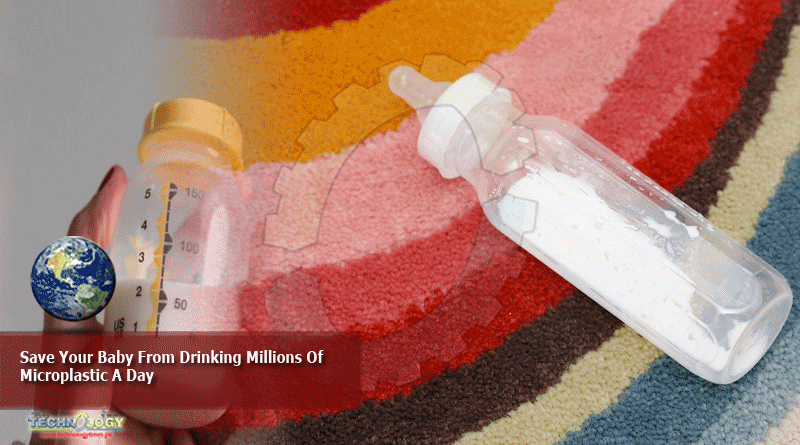Number Of Microplastic Released Jumped From 0.6 Million To 55 Million Particles When The Temperature Increased From 25°C

Babies could be consuming millions of microplastic pieces that have leached into the formula from their feeding bottles, suggests a new study published in Nature Food today. While the idea of feeding your baby a bottle filled with microplastics certainly sounds worrying, the effect of microplastics on human health is currently poorly understood. This study emphasizes the need to explore further the impact of human exposure to microplastics.
For the new study, researchers from Trinity College Dublin in Ireland bought 10 types of baby feeding bottles from Amazon and studied the number of microplastic particles released while following the World Health Organization-recommended sterilization and formula preparation techniques. All of the studied bottles were made either fully or in-part of polypropylene, one of the most commonly used plastics in the world for food preparation and storage.
They found that between 1.3 to 16.2 million microplastic particles per liter were released by the bottles during the sterilization process.
Exposure to hot water, such as using boiled water to directly sterilize the plastic bottle, was also found to significantly increase the number of microplastics in the bottles’ liquid. The number of microplastics released jumped from 0.6 million to 55 million particles when the temperature increased from 25°C (77°F) room temperature to 95°C (203°F). The researchers continued to test the same bottles for 21 days and found they continued to shed microplastics throughout the whole period.
The team followed up on this initial part of their study by estimating the level of microplastic exposure for 12-month-old infants in different parts of the world based on factors such as the types of bottles used, the average daily milk intake volume, and breastfeeding rates. They concluded that infants in Africa and Asia have the lowest potential exposure, while infants in Oceania, North America, and Europe have the highest potential exposure.
In light of the findings, the researchers provide some advice that could minimize the number of microplastics released into a feeding bottle. First and foremost, you should not reheat prepared formula in plastic containers and avoid microwave ovens. It’s advised that people prepare infant formula in a non-plastic container using water heated to at least 70°C (158°F). Cool this down to room temperature then transfer prepared formula into a high-quality plastic infant feeding bottle. For sterilizing purposes, it’s recommended you prepare sterilized water by boiling in a non-plastic kettle (such as glass or stainless steel) and rinse the sterilized bottle using room temperature sterilized water at least three times.
There are important things to consider when reading about this study. The effects of microplastic on human health are not totally understood by science and wider evidence for the toxicity of microplastics in human food is also pretty scant. The World Health Organization (WHO) currently says there’s “no evidence to indicate human health concern” of microplastics in drinking water, although they note this is based on the limited amount of information currently available.
The researchers themselves note that the study did not determine any implications in babies’ health, and they don’t want to alarm parents. However, the research makes a strong case for further study into an area that is considerably lacking right now.
“The findings of this paper may sound quite scary, at first, but we should keep in mind the research only looks at potential microplastic exposure, it does not look at potential effects of such exposure. Indeed, we really know very little about the effects of microplastics on children – or adults for that matter,” said Professor Oliver Jones, from the School of Science at RMIT University in Melbourne, Australia, who was not involved in the study
“The above non-withstanding, this study is another piece of the puzzle that illustrates that microplastics problem is likely much bigger than we think. This issue is something we need to start really getting to grips with sooner rather than later.”
This news was originally published at iflscience.com
